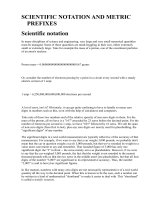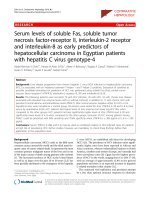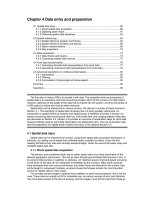Chapter 4.2: Wireless and Mobile Networks
Bạn đang xem bản rút gọn của tài liệu. Xem và tải ngay bản đầy đủ của tài liệu tại đây (835.01 KB, 32 trang )
Chapter 4.2:
Wireless and Mobile Networks
NGUYỄN CAO ĐẠT
E-mail:
Hochiminh City University Of Technology
Computer Science & Engineering
© 2014
Computer Networks 2
Chapter 4: Wireless and Mobile Networks
1
Outline
Mobility
Principles: addressing and routing to
mobile users
Mobile IP
Handling mobility in cellular networks
Mobility and higher-layer protocols
Summary
Hochiminh City University Of Technology
Computer Science & Engineering
© 2014
Computer Networks 2
Chapter 4: Wireless and Mobile Networks
2
What is mobility?
spectrum of mobility, from the network perspective:
no mobility
mobile wireless user,
using same access
point
high mobility
mobile user,
connecting/
disconnecting from
network using
DHCP.
mobile user, passing
through multiple
access point while
maintaining ongoing
connections (like cell
phone)
Hochiminh City University Of Technology
Computer Science & Engineering
© 2014
Computer Networks 2
Chapter 4: Wireless and Mobile Networks
3
Mobility: vocabulary
home network: permanent
“home” of mobile
(e.g., 128.119.40/24)
home agent: entity that will
perform mobility functions on
behalf of mobile, when mobile is
remote
wide area
network
permanent address:
address in home
network, can always be
used to reach mobile
e.g., 128.119.40.186
Hochiminh City University Of Technology
Computer Science & Engineering
© 2014
Computer Networks 2
Chapter 4: Wireless and Mobile Networks
4
Mobility: more vocabulary
permanent address: remains
constant (e.g., 128.119.40.186)
visited network: network in
which mobile currently
resides (e.g., 79.129.13/24)
care-of-address: address
in visited network.
(e.g., 79,129.13.2)
wide area
network
correspondent: wants
to communicate with
mobile
Hochiminh City University Of Technology
Computer Science & Engineering
© 2014
foreign agent: entity in
visited network that
performs mobility
functions on behalf of
mobile.
Computer Networks 2
Chapter 4: Wireless and Mobile Networks
5
How do you contact a mobile friend
Consider friend frequently
changing addresses, how do
you find her?
I wonder where
Alice moved to?
search all phone books?
call her parents?
expect her to let you
know where he/she is?
Hochiminh City University Of Technology
Computer Science & Engineering
© 2014
Computer Networks 2
Chapter 4: Wireless and Mobile Networks
6
Mobility: approaches
let routing handle it: routers advertise
permanent address of mobile-nodes-inresidence via usual routing table exchange.
routing tables indicate where each mobile located
no changes to end-systems
let end-systems handle it:
indirect routing: communication from correspondent
to mobile goes through home agent, then forwarded
to remote
direct routing: correspondent gets foreign address of
mobile, sends directly to mobile
Hochiminh City University Of Technology
Computer Science & Engineering
© 2014
Computer Networks 2
Chapter 4: Wireless and Mobile Networks
7
Mobility: approaches
let routing handle it: routers advertise
not
permanent address of mobile-nodes-inscalable
to millions
of exchange.
residence via usual routing
table
mobiles
routing tables indicate where each mobile located
no changes to end-systems
let end-systems handle it:
indirect routing: communication from correspondent
to mobile goes through home agent, then forwarded
to remote
direct routing: correspondent gets foreign address of
mobile, sends directly to mobile
Hochiminh City University Of Technology
Computer Science & Engineering
© 2014
Computer Networks 2
Chapter 4: Wireless and Mobile Networks
8
Mobility: registration
visited network
home network
2
1
wide area
network
foreign agent contacts home
agent home: “this mobile is
resident in my network”
mobile contacts
foreign agent on
entering visited
network
end result:
foreign agent knows about mobile
home agent knows location of mobile
Hochiminh City University Of Technology
Computer Science & Engineering
© 2014
Computer Networks 2
Chapter 4: Wireless and Mobile Networks
9
Indirect routing
suppose mobile user moves to another
network
registers with new foreign agent
new foreign agent registers with home agent
home agent update care-of-address for mobile
packets continue to be forwarded to mobile (but
with new care-of-address)
mobility, changing foreign networks
transparent: on going connections can be
maintained!
Hochiminh City University Of Technology
Computer Science & Engineering
© 2014
Computer Networks 2
Chapter 4: Wireless and Mobile Networks
10
Indirect routing
home agent intercepts
packets, forwards to
foreign agent
foreign agent
receives packets,
forwards to mobile
visited
network
home
network
3
1
correspondent
addresses packets
using home address of
mobile
Hochiminh City University Of Technology
Computer Science & Engineering
© 2014
wide area
network
2
4
mobile replies
directly to
correspondent
Computer Networks 2
Chapter 4: Wireless and Mobile Networks
11
Indirect routing: comments
mobile uses two addresses:
permanent address: used by correspondent (hence mobile
location is transparent to correspondent)
care-of-address: used by home agent to forward datagrams to
mobile
foreign agent functions may be done by mobile itself
triangle routing: correspondent-home-network-mobile
inefficient when correspondent, mobile are in same
network
Hochiminh City University Of Technology
Computer Science & Engineering
© 2014
Computer Networks 2
Chapter 4: Wireless and Mobile Networks
12
Direct routing
correspondent forwards
to foreign agent
foreign agent
receives packets,
forwards to mobile
visited
network
home
network
3
1
correspondent
requests, receives
foreign address of
mobile
Hochiminh City University Of Technology
Computer Science & Engineering
© 2014
2
4
mobile replies
directly to
correspondent
Computer Networks 2
Chapter 4: Wireless and Mobile Networks
13
Direct routing: comments
overcome triangle routing problem
non-transparent to correspondent:
correspondent must get care-of-address from
home agent
what if mobile changes visited network?
3
1
Hochiminh City University Of Technology
Computer Science & Engineering
© 2014
2
4
Computer Networks 2
Chapter 4: Wireless and Mobile Networks
14
Direct routing
anchor foreign agent: FA in first visited network
data always routed first to anchor FA
when mobile moves: new FA arranges to have
data forwarded from old FA (chaining)
foreign net visited
at session start
wide area
network
anchor
foreign
agent
1
2
4
5
correspondent
agent
correspondent
Hochiminh City University Of Technology
Computer Science & Engineering
© 2014
3
new foreign
agent
new
foreign
network
Computer Networks 2
Chapter 4: Wireless and Mobile Networks
15
Outline
Mobility
Principles: addressing and routing to
mobile users
Mobile IP
Handling mobility in cellular networks
Mobility and higher-layer protocols
Summary
Hochiminh City University Of Technology
Computer Science & Engineering
© 2014
Computer Networks 2
Chapter 4: Wireless and Mobile Networks
16
Mobile IP
RFC 3344
has many features we’ve seen:
home agents, foreign agents, foreign-agent registration,
care-of-addresses, encapsulation (packet-within-apacket)
three components to standard:
indirect routing of datagrams
agent discovery
registration with home agent
Hochiminh City University Of Technology
Computer Science & Engineering
© 2014
Computer Networks 2
Chapter 4: Wireless and Mobile Networks
17
Mobile IP: indirect routing
foreign-agent-to-mobile packet
packet sent by home agent to foreign
agent: a packet within a packet
dest: 79.129.13.2
dest: 128.119.40.186
dest: 128.119.40.186
Permanent address:
128.119.40.186
dest: 128.119.40.186
Care-of address:
79.129.13.2
packet sent by
correspondent
Hochiminh City University Of Technology
Computer Science & Engineering
© 2014
Computer Networks 2
Chapter 4: Wireless and Mobile Networks
18
Mobile IP: agent discovery
agent advertisement: foreign/home agents advertise
service by broadcasting ICMP messages (typefield = 9)
0
type = 9
24
checksum
=9
code = 0
=9
H,F bits: home and/or
foreign agent
R bit: registration
required
16
8
standard
ICMP fields
router address
type = 16
length
registration lifetime
sequence #
RBHFMGV
bits
reserved
0 or more care-ofaddresses
Hochiminh City University Of Technology
Computer Science & Engineering
© 2014
mobility agent
advertisement
extension
Computer Networks 2
Chapter 4: Wireless and Mobile Networks
19
Mobile IP: registration example
home agent
HA: 128.119.40.7
visited network: 79.129.13/24
foreign agent
COA: 79.129.13.2
ICMP agent adv.
mobile agent
MA: 128.119.40.186
COA:
79.129.13.2
….
registration req.
COA: 79.129.13.2
HA: 128.119.40.7
MA: 128.119.40.186
Lifetime: 9999
identification: 714
encapsulation format
….
registration reply
HA: 128.119.40.7
MA: 128.119.40.186
Lifetime: 4999
Identification: 714
encapsulation format
….
time
Hochiminh City University Of Technology
Computer Science & Engineering
© 2014
registration req.
COA: 79.129.13.2
HA: 128.119.40.7
MA: 128.119.40.186
Lifetime: 9999
identification:714
….
registration reply
HA: 128.119.40.7
MA: 128.119.40.186
Lifetime: 4999
Identification: 714
….
Computer Networks 2
Chapter 4: Wireless and Mobile Networks
20
Outline
Mobility
Principles: addressing and routing to
mobile users
Mobile IP
Handling mobility in cellular networks
Mobility and higher-layer protocols
Summary
Hochiminh City University Of Technology
Computer Science & Engineering
© 2014
Computer Networks 2
Chapter 4: Wireless and Mobile Networks
21
Components of cellular network architecture
correspondent
wired public
telephone
network
MSC
MSC
MSC
MSC
MSC
different cellular networks,
operated by different providers
Hochiminh City University Of Technology
Computer Science & Engineering
© 2014
Computer Networks 2
Chapter 4: Wireless and Mobile Networks
22
Handling mobility in cellular networks
home network: network of cellular provider you
subscribe to
home location register (HLR): database in home network
containing permanent cell phone #, profile information
(services, preferences, billing), information about current
location (could be in another network)
visited network: network in which mobile currently
resides
visitor location register (VLR): database with entry for
each user currently in network
could be home network
Hochiminh City University Of Technology
Computer Science & Engineering
© 2014
Computer Networks 2
Chapter 4: Wireless and Mobile Networks
23
GSM: indirect routing to mobile
home
network
HLR
2
home MSC consults HLR,
gets roaming number of
mobile in visited network
correspondent
home
Mobile
Switching
Center
1
3
VLR
Mobile
Switching
Center
4
home MSC sets up 2nd leg of call
to MSC in visited network
mobile
user
visited
network
Hochiminh City University Of Technology
Computer Science & Engineering
© 2014
Public
switched
telephone
network
call routed
to home network
MSC in visited network completes
call through base station to mobile
Computer Networks 2
Chapter 4: Wireless and Mobile Networks
24
GSM: handoff with common MSC
VLR Mobile
handoff goal: route call via
new base station (without
interruption)
reasons for handoff:
Switching
Center
old
routing
new
routing
old BSS
new BSS
Hochiminh City University Of Technology
Computer Science & Engineering
© 2014
stronger signal to/from new BSS
(continuing connectivity, less
battery drain)
load balance: free up channel in
current BSS
GSM doesnt mandate why to
perform handoff (policy), only how
(mechanism)
handoff initiated by old BSS
Computer Networks 2
Chapter 4: Wireless and Mobile Networks
25









